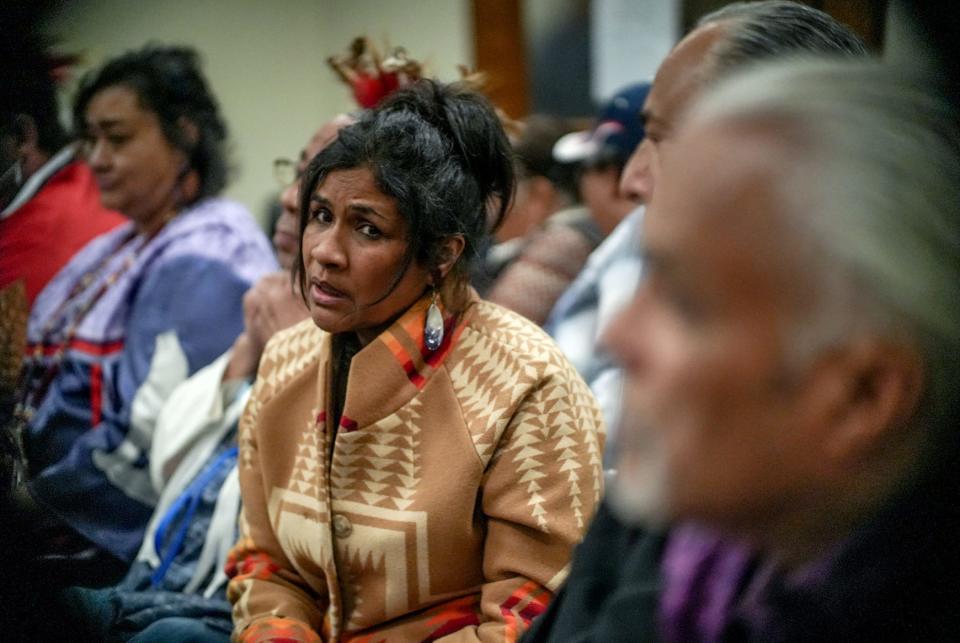Narragansett Tribe seeks sovereignty, others want recognition. The debate is impassioned
Thorny questions of indigenous rights and tribal identity spilled into view this week when the House Committee on State Government heard testimony on several bills that would affect descendants of this area's original inhabitants.
One slate of bills proposes to recognize Narragansett tribal sovereignty and give the tribe more say over its lands, in addition to extending broad property tax breaks to tribal members.
Another set of bills seeks to recognize the Seaconke Wampanoag, a tribe recognized in Massachusetts but not in Rhode Island, and create a process where any group could petition for tribal recognition. Those bills face strong opposition by the Narragansett Indian Tribe, which argues that no other tribe has a valid claim to Rhode Island.
Beach access: Narragansett Tribe will be able to walk onto Narragansett Town Beach for free — here's why

Acknowledging Narragansett sovereignty and giving tribal members a tax break
House Bill 5969 would recognize the Narragansett Indian Tribe as "the aboriginal people of this land, sovereign to the territory of what is now Rhode Island."
It would also repeal laws that govern planning and zoning on tribal settlement lands in Charlestown, and get rid of the statute that says those lands are subject to state and town laws.
House Bill 5970 would exempt tribal members from paying property taxes on commercial buildings, businesses and land trusts. House Bill 5971 would create a tax exemption for their residential properties.
All three were introduced by Rep. Brianna Henries, D-East Providence, who described herself as a representative of the Nipmuc Tribe. She characterized the bills as a way to "rectify a lot of the wrongs that we've done, as a state, to the Narragansett Tribe."

McKee administration foresees legal problems
Gov. Dan McKee's executive counsel, Claire Richards, submitted written testimony in opposition to H 5969. She noted that tribal sovereignty "is a matter of federal law, not state law," saying that many of the changes that the bill is seeking would require an act of Congress.
Additionally, repealing selected portions of the Narragansett Indian Land Management Corporation Act "will likely muddy the respective rights of the Tribe and the State," she wrote.
Speaking in favor of the bills, Narragansett tribal member Bella Noka described the laws that give the state authority over certain matters on tribal lands as "a knee on the neck."
She went on to note that nonprofits and churches are exempt from property taxes, saying that tribal members' homes are often where they "hold ceremony," and should get the same tax breaks.
"There are only 3,400 of us," she said. "Two thousand are under the age of 18. Another thousand live outside of the state of Rhode Island. So there's a few hundred that own homes ... it's not going to be a burden on you whatsoever."
Also on the docket: Recognizing the Seaconke Wampanoag
House Bill 5021 would formally recognize the Seaconke Wampanoag tribe, with the intent of making its members eligible for grants, federal benefits, and legal protections that are available to Native Americans. A separate bill, House Bill 5020, would establish a process for any Native American tribe to seek recognition on the state level.
Both are sponsored by Rep. Camille Vella-Wilkinson, D-Warwick, for the third year in a row.
As in past years, these bills face opposition from the Narragansett Indian Tribe, which is the only federally-recognized tribe in Rhode Island.
The Seaconke Wampanoag "have their land base in Massachusetts. They are recognized there," Noka said. "They have never, ever been here ... We have always been the tribal nation of this land."
The Seaconke Wampanoag, on the other hand, say their territory extended into what is now Rhode Island, including the East Bay. Author Deborah Spears Moorehead noted that the Wampanoag Sachem Massasoit lived in Sowams, or present-day Warren.
"How can anyone say that we’re not indigenous to Rhode Island?" she asked.

Tribe anticipates unlocking 'millions of dollars' in federal funds
The dispute isn't just about relitigating vague boundaries from hundreds of years ago. Darrell Waldron, chief of the Seaconke Wampanoag and executive director of the Rhode Island Indian Council, testified that state-level recognition for his tribe would unlock federal funds and "bring millions of dollars into the state of Rhode Island."
Noka took issue with what she described as a focus on "economic gain." She called on the Seaconke Wampanoag to "withdraw your application," saying, "You’re going to be opening the door for 10, 12 more tribes that are knocking on the door because they want a piece of that pot."
The issue is complicated by the fact that the two tribes have a long history of intermarriage. Randy Noka, who is also a Narragansett tribal member and testified against the bills, noted that his own mother was Seaconke Wampanoag. Waldron, similarly, acknowledged that he has Narragansett ancestry.
"I don't want to fight my native brethren," he said.
The McKee administration submitted written testimony in opposition to both bills. State government "does not currently have the resources to make accurate determinations about tribal existence," Richards wrote.
Additionally, she said, neither of the bills would require input from anthropologists, historians, genealogists "or anyone else with the requisite expertise to make these determinations."
This article originally appeared on The Providence Journal: Narragansett Indian Tribe seeks tax cuts, sovereignty over land

 Yahoo Autos
Yahoo Autos 